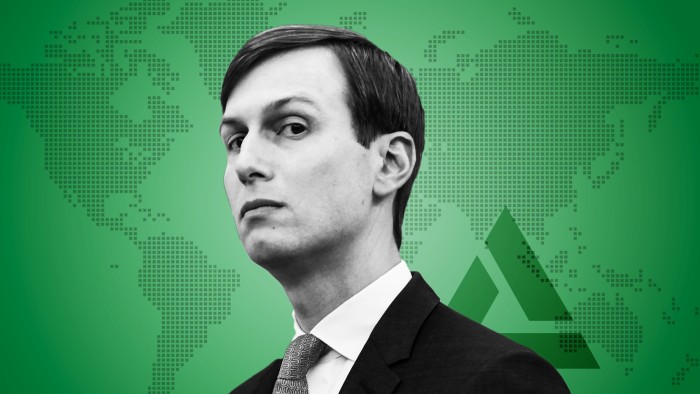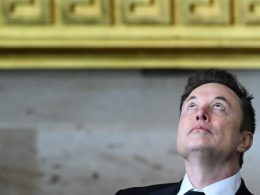Jared Kushner was yachting in the Mediterranean with his family in the summer of 2021, a few months after the end of his father-in-law Donald Trump’s tumultuous first term. As they anchored off the Albanian coast, he asked a friend to help broker a meeting on his boat with the country’s prime minister Edi Rama.
Over dinner, the affable Rama bonded with Kushner and discussed how Albania’s stunning Adriatic coast is often ignored by wealthy tourists criss-crossing between Italy and the Greek islands.
“Kushner didn’t mention investments,” Rama recalls. “He was just asking about Albania . . . Practically they were clueless about Albanian history.” The Kushners left the next day.
When they met again at Davos a few months later, Rama says Kushner told him he loved Albania. Kushner had met Mohamed Alabbar, the billionaire Gulf investor who is developing a luxury marina in the Albanian port of Durrës, and the two men had discussed potential investment, Rama says. “I said that would be incredible.”
Kushner visited again in the summer of 2023 with a larger entourage including Richard Grenell, a hard-charging Trump ally who served in his first term as his Balkans representative — and was recently appointed as a special envoy for his second term. “They stayed about a week, visiting various sites,” Rama says. “This time, Kushner was direct: ‘We’re keen to invest.’”
On December 30 last year, just three weeks before Trump’s second inauguration, the Albanian government gave preliminary approval for Kushner to develop a $1.4bn luxury resort on Sazan, Albania’s only island in the Mediterranean. It is one of the most high-profile investments to date by his private equity firm, Affinity Partners, which Kushner set up just after the end of Trump’s first term, primarily with funds from Saudi Arabia.
The Albania deal is a window into the business empire that Kushner has constructed since leaving his position as a senior adviser in the first Trump White House, where he was a central figure in a number of foreign policy issues, especially in the Middle East, and considered by many diplomats to be an effective problem-solver.
Before his interlude in politics, Kushner was a property developer whose primary focus was New York City. Since leaving Washington, however, he has built up a global portfolio of company stakes and property, across eastern Europe, the Gulf and Latin America.
Many of those deals have been facilitated by contacts he made while in government — or by the high profile that comes from having been one of his father-in-law’s most trusted aides. Kushner has demonstrated an ability to convert relationships and proximity to power into big investments.
In one example, he is now positioning himself as a conduit for Gulf investors interested in putting money into Israel’s dynamic private sector.
Kushner says his business model is based on an ability to see trends before others. “I’m very comfortable being contrarian,” he tells the FT. “I was willing to back Trump when people in my circle thought that wasn’t popular or smart. I believed I could make progress in the Middle East when everyone said I was crazy.”

Even before Trump won re-election, Kushner faced claims of potential conflicts of interest. Democrats have suggested that investors in the Gulf might see allocating funding to Kushner as a way to curry favour with Trump.
Those questions are only likely to grow now Trump is back in the White House. Kushner is not taking a formal role, but he has made himself available to advise the administration on specific issues.
In particular, he is animated by the potential for a rapprochement between Saudi Arabia and Israel, two countries where he has deep political contacts. Yet that would mean him advising on an issue affecting the Saudi state, which is also one of the biggest investors in Affinity.
“I worry that Kushner, as well as other Trump family members, will gain financial advantage by using their status to suggest they can influence the administration’s policy,” says Michael Meltsner, professor of law at Northeastern University.
Kushner insists there is no conflict of interest and that most of the criticism is partisan politics. “These are not legitimate inquiries,” he says. “It is a politically motivated attack that has no substance.”
The scion of a New York real estate empire, Kushner made his first profits while he was at Harvard in the early 2000s by buying $9mn in apartments in a working-class Boston suburb, later selling them for nearly double as the area gentrified.
But a formative test came just before the financial crisis. In 2005, he assumed oversight of the family property business when his father, Charles, was jailed on charges of tax fraud and witness tampering. Charles was accused of hiring a prostitute to seduce his brother-in-law, who had been co-operating with the authorities. He was pardoned by Trump in 2020 and has been nominated to be the next US ambassador to France.

The Kushners made a splash in 2007 by selling off outer-borough assets to fund a $1.8bn purchase of a Fifth Avenue skyscraper. The timing was awful and the property was soon worth less than its debt, leading to years of negotiation where Kushner and his father kept lenders at bay and continued to invest heavily, ploughing $14bn into property deals.
By 2011, Kushner had sold the building’s retail space for $1bn to cut its debt but the financial struggles continued deep into Trump’s first presidency. In 2018, Canadian property giant Brookfield paid $1.1bn to take control of the building, allowing Kushner to repay burdensome debts and retain an interest in its ground lease.
By then, Kushner was one of the influential advisers in the White House. He was able to build deep ties with key players across the Middle East, forming friendships with Israeli Prime Minister Benjamin Netanyahu, Saudi Crown Prince Mohammed bin Salman and Sheikh Mohamed bin Zayed bin Sultan Al Nahyan, president of the UAE.
Kushner was in the forefront of the US negotiations over the Abraham Accords, which led to the normalisation of Israel’s ties with the UAE and Bahrain. And he translated his diplomatic coup into an opportunity.
In January 2021, he launched Affinity to focus on sectors such as AI and clean energy. A key early backer has been the Saudi sovereign wealth fund, which invested $2bn — virtually all of the firm’s initial outside investment. Last year, Kushner attracted $1.5bn more from the UAE and Qatar and now manages $4.6bn.

The large capital haul for a small firm with virtually no investment track record set Kushner up to make money simply by managing the funds. At a fee rate of 1.25 per cent of investors’ capital, Affinity stands to make millions of dollars annually in management fees, with most of any cash over its operating expenses going to Kushner, its majority owner. To earn more lucrative performance fees, Kushner’s investments will have to hit high performance hurdles.
His fledgling PE group, based in a waterfront Miami skyscraper also occupied by billionaire financier Carl Icahn, started with about two dozen employees, including ex-White House staffers Avi Berkowitz, a lead on the Abraham Accords, Kevin Hassett, an economic adviser to Trump, and Thomas Storch, former deputy director of international economics. The investment staff also include Luis Videgaray, a former Mexican foreign minister. However the firm has seen considerable turnover, with some early employees returning to government roles.
During Kushner’s first full year of investing, Affinity struck three large deals including investing $200mn in Mosaic, a rooftop solar equipment financing company. Other early deals included Dubizzle, a UAE-based online classifieds business, and Unybrands, a so-called aggregator of vendors within Amazon’s ecommerce platform that was backed by former WeWork chief Adam Neumann, whom Kushner had befriended years earlier.
More recently, he has invested hundreds of millions of dollars and taken a board seat on QXO, an acquisition vehicle led by billionaire financier Bradley Jacobs that recently launched a $11bn hostile takeover effort for a US building supplies company.
Kushner has also built large minority investments in two prominent Israeli companies, including Phoenix Financial, a fast growing Israeli insurance conglomerate that now manages over $100bn in assets for policyholders in the region.
He believes his unique contacts in both Israel and the Gulf make him a trusted go-between. “Affinity is about people coming together to make things happen that wouldn’t otherwise,” he says. In 2023, a UAE state fund had tried to invest in Phoenix, but was blocked by Israeli regulators. Kushner’s investment of Saudi, UAE and Qatari-funds into the insurer, however, won approval.
Affinity’s early deals have yet to yield large returns. Unybrands struggled with slowing growth and missed financial filings for two years, suggesting financial difficulties. The collapse of its larger rival, Thrasio, cast doubt on the future of Amazon aggregators. Affinity says that Unybrands has positive cash flow.
Mosaic Solar, Affinity’s first announced deal, faces pressure from renewable energy subsidy cuts under a new Trump administration. The firm has invested more than $2bn and committed to another $1bn of investments but has not yet returned much cash to investors, according to a Senate probe last year. Private equity investors generally exit investments after five years, which means that the lack of distributions from Affinity is not yet entirely unusual.
But not all investments faltered. Affinity-backed German fitness company EGYM recently raised $200mn at an implied valuation of over $1bn, about twice its original cost. The market values of both Phoenix and QXO have also risen since Affinity’s first investment.
Kushner is now in talks over AI and data centre deals that could be worth billions, and is negotiating a large deal in Mexico for a waste management company — another country he was closely involved with while at the White House — believing the country will see industrial activity rise from the nearshoring of US supply chains. The threat of tariffs could derail the deal, however.
An investor who is close to Kushner says that he “is focused on building his investment business up”. He adds. “He [Kushner] definitely has something to prove there.”
After initially steering clear of real estate, Affinity has also stepped back into the property world — but this time far from Manhattan.
The first deal drew on ties with political leaders established in Trump’s first term. In Belgrade, the capital of Serbia, Affinity has leased the site of the old Yugoslav Ministry of Defence that is being torn down and redeveloped into a swanky hotel and residential complex.
Serbia’s president Aleksandr Vučić, who had a good relationship with the first Trump administration, told the FT last year he was very proud of the project. “It will bring more investors — and this will bring more and more people to Belgrade,” he said. “This is good for Serbian American friendship.”
Grenell, who was heavily involved in diplomacy in the western Balkans towards the end of Trump’s first term, has presented the deal as part of an attempt to improve Serbia’s ties with the west and move it away from Russia, its historical soulmate.

“Grenell never quit,” says Zorana Mihajlović, a former deputy prime minister for eight years until 2022. “He has always been here.”
Rama, Albania’s prime minister, is also delighted by the investment in his country. Trump’s proximity to the luxury resort deal “is a huge added value, I can’t hide it,” he says. “After Jared announced the deal, the prices of real estate in [the nearby resort of] Vlorë had a visible jump.”
By focusing on super-luxury clients, Kushner’s project will help Albania benefit from tourism without causing as much damage to conservation reserves as a mass-market development, Rama says. “We need super luxury in this country like the desert needs water,” he adds. “What you gain from 500 yachts is the same as from 40,000 budget tourists.”
But it is the Middle East that poses both the greatest possible returns — and potential conflicts of interest.
In a talk at Harvard last year, Kushner described bin Salman as a “friend” and said the two men held regular discussions, as he claimed some of the credit for bringing Saudi Arabia into the heart of the first Trump administration’s Middle East strategy.
Kushner said that Trump had come into office ready to be “rough” with Saudi Arabia, until bin Salman pitched Kushner on his plans to modernise the kingdom — from allowing women to drive to cracking down on extremism. In short order, Saudi Arabia was picked as Trump’s first overseas visit.
“[Kushner’s] got a close relationship with Crown Prince Mohammed bin Salman and those who have dealt with him say he’s got the right cultural literacy to operate in the region,” says Helima Croft, a former CIA analyst who is now head of Middle East research at RBC Capital Markets. “He tends to listen more than lecture, and puts the time in with the key players.

“If the Trump administration is serious about normalisation [between Saudi Arabia and Israel] I suspect they’ll want to have Jared on the team, even if he’s more in the background this time around.”
While he is not taking a job in the administration, he says “I’m here to help and give advice as needed.” Yet even an informal role in the administration’s diplomacy will lead to greater scrutiny.
Since its creation, Affinity has been viewed suspiciously in Washington, particularly among Democratic lawmakers who have characterised the millions in annual fees it earns from Saudi and UAE-based investors as acts of foreign influence.
“Affinity’s investors may not be motivated by commercial considerations, but rather the opportunity to funnel foreign government money to members of President Trump’s family, namely Jared Kushner and Ivanka Trump,” said Senator Ron Wyden as part of a Senate finance committee investigation into the fund.
The concern among some national security experts is that Kushner is profiting from connections made during his time in government and that, given his close ties to Trump, he could be used to serve the interest of foreign states in thorny diplomatic matters.
Wyden and Jamie Raskin, a member of Congress’s committee on oversight and accountability, requested in October that the Department of Justice appoint a special counsel to investigate Kushner’s business dealings. “While on the Saudi government’s payroll, Mr Kushner is simultaneously serving as a political consultant to former President Trump and acting as a shadow diplomat and political adviser to Saudi Crown Prince Mohammed bin Salman and other foreign principals. Despite being engaged in plainly political activities,” they said in a statement.
Despite the criticism, Kushner has never been accused of wrongdoing. “These guys won’t acknowledge [that] I have an incredible track record of success in the Middle East,” he says of the Democratic politicians. “I have those great relationships because of the success that I achieved, which was something that I was criticised for trying to do at every step along the way.”
Kushner says Affinity has always acted appropriately. “A lot of these people will say everything is a conflict. I am not going to let that stop me.”
Some ethics experts believe that Trump and his family members may feel empowered to act with impunity partly given the conduct of Joe Biden and his son Hunter, who faced criticism for his own business dealings, including in Ukraine. Hunter Biden was convicted of a separate offence not related to his business dealings which he received a pardon for.
Richard Painter, former chief White House ethics lawyer in the George W Bush administration, says that ideally the president’s children — and his son-in-law — would stand down from business transactions that might create the appearance of conflict of interest.
In the past “the understanding was that family members of presidents should avoid situations that might give the appearance that people are doing business with them to create favour with the president,” he says.
“But unfortunately, I think that both from the first Trump administration and the Biden administration with Hunter Biden . . . we’ve sort of gone beyond that.”
Source link










